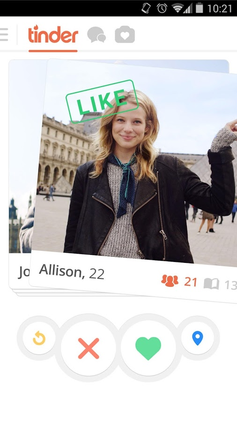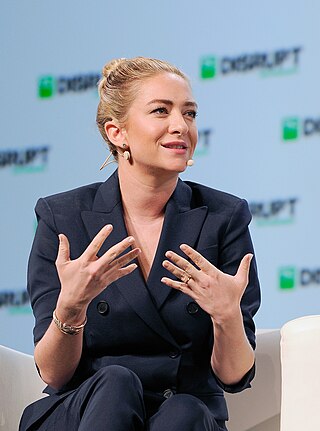Related Research Articles

Jdate is an online dating service aimed at Jewish singles. The service is one of a number of demographically focused online match-making websites operated by Spark Networks, Inc.

OkCupid is a U.S.-based, internationally operating online dating, friendship, and formerly also a social networking website and application. It features multiple-choice questions to match members. Registration is free. OkCupid is owned by Match Group, which also owns Tinder, Hinge, Plenty of Fish, and many other popular dating apps and sites.
This is a partial, non-exhaustive list of notable online dating websites and mobile apps.

Spark Networks GmbH is an American-German dating company with a portfolio of brands designed for singles seeking serious relationships. These online dating brands include Zoosk, SilverSingles, EliteSingles, Jdate, ChristianMingle, eDarling, JSwipe, AdventistSingles, LDSSingles, and Attractive World. Formed in 2017 through the merger of Affinitas GmbH and Spark Networks, Inc., the company has a presence in 29 countries worldwide.
Andrey Andreev is a multinational tech entrepreneur. He is known for founding the dating and social networking apps Bumble and Badoo, amongst others. In 2019, Andreev sold the apps' holding company, MagicLab, to Blackstone at a $3 billion valuation. In 2020, he founded social audio app Stereo. His previous ventures include SpyLog, Begun, and Mamba.
The Matzo Ball is an annual Christmas Eve nightlife event and party held in a number of major cities in the United States targeted primarily at young Jewish singles and organized by Mazel Events, LLC.
Sam Yagan is an American Internet entrepreneur best known as the co-founder of OkCupid. In 2013, he was named to TIME Magazine's '100 Most Influential People in the World' list. He is the Vice-Chairman of the e-dating site Match.com.

Tinder is an online dating and geosocial networking application launched in 2012. On Tinder, users "swipe right" to like or "swipe left" to dislike other users' profiles, which include their photos, a short bio, and some of their interests. Tinder uses a "double opt-in" system, also called "matching", where two users must like each other before they can exchange messages.

Sean Rad is an American entrepreneur and Founder of the dating app Tinder. Rad launched Tinder in 2012 and by 2014 the company was recording one billion "swipes" a day.

Whitney Wolfe Herd is an American entrepreneur. She is the founder, executive chair, and former CEO of publicly traded Bumble, an online dating platform, launched in 2014. She is a co-founder of Tinder and was previously its Vice President of Marketing.
Bumble is an online dating and networking application launched in 2014. Profiles of potential matches are displayed to users, who can "swipe left" to reject a candidate or "swipe right" to indicate interest. Until 2024 only female users could make the first contact with matched male users, while in homosexual matches either person can send a message first. The app is a product of Bumble Inc.

Founded in 2012, Mallzee is a fashion mobile commerce company and shopping application. Its application allows online shoppers with a smartphone to access millions of products from over 100 fashion brands around the world. The mobile app was launched in September 2013 and uses a 'like' or 'dislike' swiping interface and has since been labelled as the 'Tinder of fashion', in reference to the Tinder app. In 2015, the application was launched in the US.
Match Group, Inc. is an American internet and technology company headquartered in Dallas, Texas. It owns and operates the largest global portfolio of popular online dating services including Tinder, Match.com, Meetic, OkCupid, Hinge, Plenty of Fish, OurTime, and other dating global brands. The company was owned by IAC until July 2020 when Match Group was spun off as a separate, public company. As of 2019, the company had 9.3 million subscribers, of which 4.6 million were in North America. Japan is the company's second largest market, after the United States.

Paktor is a location-based dating and networking mobile application that connects mutually interested users and allows them to chat individually or as a group. Founded in Singapore, the app was launched in June 2013, and has over 5 billion swipes to date. In late 2013, Paktor launched a subsidiary called GaiGai, an offline dating service that focuses on match-making and dating events. The word 'Paktor' originates from the Cantonese word for 'dating'.
An online dating application, commonly known as a dating app, is an online dating service presented through a mobile phone application. These apps often take advantage of a smartphone's GPS location capabilities, always on-hand presence, and access to mobile wallets. These apps aim to speed up the online dating process of sifting through potential dating partners, chatting, flirting, and potentially meeting or becoming romantically involved.
MPWH is an American-based international Herpes dating community. MPWH offers an exclusive platform for positive singles who are living with Herpes to find support, friendship and love.

The League is a social and dating mobile application launched in 2015 and available in several cities all over the world on iOS and Android.

Hinge is an online dating application. Using an algorithm, the app displays potential matches, allowing the user to dismiss or attempt to match by responding to a specific piece of content on their profile. The service emphasizes uploading user-generated content in a variety of formats, such as photos, videos, and "prompts" as a way to express personality and appearance. The app is fully owned by Match Group as of February 2019.

Hily is an online dating application that employs machine learning to match prospective partners. Named as an acronym for "Hey, I Like You", the app is designed to recommend potential matches by analyzing users' backgrounds, interests, and app activity. The app's registration options for gender include male, female, and non-binary.
Jigsaw is a personality-based online dating application. The face of the user in this application is hidden using a digital jigsaw puzzle and the face reveals piece by piece through profile interactions and message exchanges. The concept was granted a US patent in early 2021.
References
- 1 2 3 4 5 Malone, Clare (March 13, 2015). "For Nice Jewish Guys, Swipe Right". The New York Times . Retrieved February 6, 2019.
- 1 2 3 4 5 Shire, Emily (January 5, 2015). "My Week on Jewish Tinder". The Daily Beast . Retrieved February 7, 2019.
- 1 2 3 "Spark Networks Acquires Smooch Labs, Owner of the JSwipe Mobile Application" (Press release). Los Angeles, CA: Yahoo Finance. Marketwired. October 14, 2015. Retrieved February 5, 2019.
- 1 2 3 Arom, Eitan (February 11, 2016). "Rounding out a big year, JDate CEO has reason to celebrate". Los Angeles Jewish Journal . Retrieved February 7, 2019.
- 1 2 3 4 5 6 7 8 9 Ghert-Zand, Renee (February 13, 2015). "New dating app has Jews swiping one another off their feet". The Times of Israel . Retrieved February 7, 2019.
- 1 2 3 4 5 Dale, Brady (August 4, 2015). "The Jewish Tinder Attempts Crowdfunding Campaign to Save Itself From JDate". New York Observer . Retrieved February 6, 2019.
- 1 2 3 Adkins, Laura E. (October 7, 2016). "JSwipe Right: Fall in Love With the Revolutionary Founder David Yarus". The Forward . Retrieved February 7, 2019.
- ↑ "JSWIPE Dating Experience Reaches New Heights" (Press release). Los Angeles, CA: MarketWatch. Marketwired. July 15, 2016. Archived from the original on February 9, 2019. Retrieved February 7, 2019.
- ↑ Carmona, Sergio (February 1, 2019). "JSwipe founder addresses young Jewish adults in Palm Beach County". South Florida Sun-Sentinel . Retrieved February 7, 2019.
- 1 2 3 Dale, Brady (October 15, 2015). "JDate Bought JSwipe and Everyone Loves Each Other Now". New York Observer . Retrieved February 7, 2019.
- ↑ Avraham, Orri J. (July 1, 2017). "If the swipe is right; digital dating in Israel". The Jerusalem Post . Retrieved February 7, 2019.
- 1 2 Ferenstein, Gregory (July 19, 2014). "A Jew reviews: Hands-on with Jswipe, a Tinder for the tribe". VentureBeat . Retrieved February 7, 2019.
- 1 2 3 Behrmann, Anna (April 4, 2018). "Eleven things I've learned from JSwipe". The Jewish Chronicle . Retrieved February 7, 2019.
- 1 2 3 Dale, Brady (October 10, 2015). "How Can You Patent a Dating Website? An Explainer". New York Observer . Retrieved February 6, 2019.
- 1 2 Vaitsblit, Hannah (October 16, 2015). "JDate Acquires JSwipe: The rival Jewish dating companies, once embroiled in a trademark legal battle, have agreed to a merger. Love wins". Tablet Magazine . Retrieved February 7, 2019.
- ↑ Lee, Timothy B. (August 5, 2015). "JDate claims to own the concept of connecting 2 people based on mutual attraction". Vox.com . Retrieved February 7, 2019.
- ↑ Zaltzman, Lior (July 27, 2015). "JDate is Suing JSwipe — Over the Letter J?". The Forward . Retrieved February 7, 2019.
- ↑ Ferenstein, Gregory (July 24, 2015). "Jdate Sues Competitor Jewish Dating App For Using The Letter "J"". Forbes.com . Retrieved February 7, 2019.
- ↑ "JSwipe Winter Series". The New York Blueprint. Retrieved February 7, 2019.
- ↑ Press Release, Jewish and Single? It's All About the MATZOBALL Powered by JSwipe!, New York Business Journal / PR Newswire, November 26, 2018
- ↑ Matzoball, November 15, 2018, The Jewish Standard / Times of Israel
- ↑ Adkins, Laura E. (March 2, 2017). "Meet The 45 Most Popular Women On JSwipe". The Forward . Retrieved March 2, 2017.